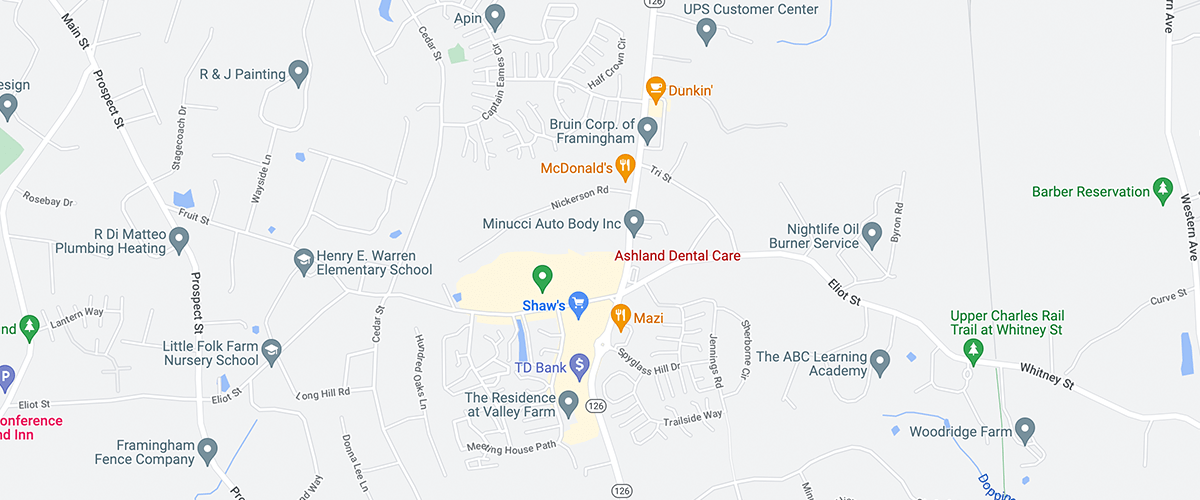September 24th, 2024

Do you feel anxious before every dentist appointment? If the answer is yes, you are not alone—more than 75 percent of Americans feel anxious when visiting their dentist. Today, our doctor and our team thought we would provide some tips to reduce your stress about visiting our Ashland office.
The first thing we want you to do is plan ahead. If at all possible, book an appointment at a time when you know you won’t be in a rush to get somewhere else, such as picking up your children from school or an important meeting at the office. We also recommend you avoid caffeine and sugar prior to your visit as too much of either can make you feel even more anxious, not to mention jittery.
Once you’re here at our office, take some slow, deep breaths to relax. Then, try to relax your muscles by sitting back comfortably. If you are still feeling anxious, let our doctor or someone on our team know. We deal with nervous patients all the time and may have additional relaxation techniques for you to try. If you’d like, we also encourage you to bring headphones and listen to music of your choice to distract yourself while we work on your teeth.
If you have additional questions about relaxation techniques, or would like to schedule an appointment, please give us a call!
September 4th, 2024

Can you believe it's already September? At Ashland Dental Care, we know that gingivitis, the early stage of periodontal disease, can be difficult to recognize. Many people don’t recognize the warning signs, bleeding and swollen gums, as a precursor to gum disease. This month, a national campaign is under way to raise awareness about gum health and periodontal disease, and we wanted to help do our part to spread the word!
our doctor will tell you early recognition and action are the most important steps to health gums, and ultimately a health body, too! Studies are published every year linking oral health, including the gums, to the health of other areas of the body, such as your heart. One of the most important steps to improving the care of your gums is recognizing the warning signs for gum disease. These can include:
- Gums that appear red or swollen
- Gums that feel tender
- Gums that bleed easily (during brushing or flossing)
- Gums that recede or pull away from the teeth
- Persistent halitosis, or bad breath
- Loose teeth
- Any change in the way teeth come together in the biting position
If you happen to notice any of these signs with you or your child, please schedule an appointment at our convenient Ashland office as soon as possible. our doctor and our team can take proactive steps to prevent gingivitis and gum disease, while showing you how to improve gum care in your or your child’s daily oral hygiene habits.
August 28th, 2024

You never know when a dental problem may arise. Unfortunately, they don’t necessarily occur during office hours. our doctor can provide you with the proper information and treatment options to prevent the problem from becoming worse.
Abscess
An abscess is a bacterial infection, and will normally cause pain and swelling around the affected tooth and gum area. Though antibiotics are not always necessary, you should be seen by our doctor as soon as possible. If left untreated, the infection may grow and cause more serious issues.
Toothache
Toothaches can have many causes. Sometimes it’s as simple as food lodged between your tooth and gums. Rinse your mouth with warm water and try flossing the area to dislodge the particle. If your gums begin to bleed, stop flossing.
Fractures or cavities can also cause toothaches as well as sensitivity to heat or cold. Please schedule an appointment to ensure a minor problem doesn’t develop into a serious one. You may require acetaminophen or another pain reliever before your visit.
If you can’t be treated right away, keep these tips in mind:
- If you have fractured a tooth, rinse the area with warm water to keep the surfaces clean. Apply a cold compress to the outside of your facial area to reduce swelling.
- A tooth that has been knocked out should be kept moist, in a clean container, until you can receive treatment.
- Do not apply aspirin directly to a damaged tooth or gum area, because this can cause tissue irritation.
- If you suspect your jaw has been broken, go to an emergency room immediately.
- If you have bitten or damaged your lips or tongue, rinse your mouth well with warm water. If bleeding continues, seek other medical attention right away.
If you experience an emergency, please contact our Ashland office and provide us with as much information as possible. This way, we can offer recommendations that will assist you until you’re able to arrive for an appointment.
Remember: procrastinating about getting treatment can turn a minor problem into a major one!
August 21st, 2024

Have you ever had that sinking feeling after biting into something soft and chewy and feeling something hard and crunchy instead? You’ve chipped or broken a tooth, but what should you do next? First try to assess the damage by determining whether it’s a chip or a whole tooth.
As our doctor will tell you, a broken or chipped tooth is usually not a dental emergency unless you are experiencing a great deal of pain or bleeding, but you should contact us for an appointment shortly afterward. Be sure to mention that you have a broken tooth so we can fit you into our schedule quickly. After a thorough evaluation, we’ll recommend a course of action. If it is a small chip, we may simply smooth it out. For a larger break, the dentist may fill in the space with a composite material that matches your other teeth.
Emergency Dental Care
If you are in severe pain, are bleeding excessively, have a major break, or have lost a tooth, that is a dental emergency and you should contact us. As emergency dental specialists, we’ll be able to schedule an appointment immediately and advise you on the next steps to take.
You can rinse your mouth with warm water and apply pressure to stop the bleeding. An ice pack will help reduce any swelling. Do not take any aspirin as that could increase the amount of bleeding. Should your tooth be knocked out completely, rinse it under running water but do not scrub it. Hold the tooth only by the crown, or the part you normally see above the gum line, not by the root. If you can, put the tooth back into the socket while you travel to our office, or put it in a mild salt solution or milk. Don’t let the tooth become dry, because this can lead to damage. Once you get to our office, our dentist will determine whether the tooth can be saved or if it will need to be replaced.
A broken tooth may not always be an emergency, but it’s best to have it treated with us at Ashland Dental Care. While it may only be a cosmetic problem at first, if left too long without treatment, you may experience further damage to your tooth and mouth.




